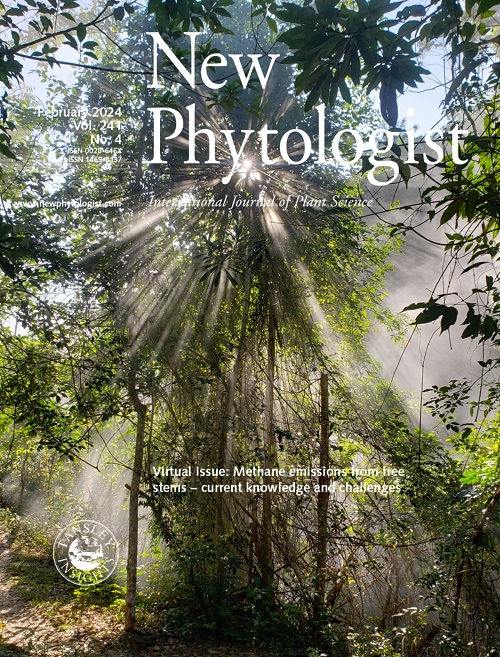The RHW1-ZCN4 regulatory pathway confers natural variation of husk leaf width in maize
IF 8.1
1区 生物学
Q1 Agricultural and Biological Sciences
引用次数: 0
Abstract
- Maize husk leaf – the outer leafy layers covering the ear – modulates kernel yield and quality. Despite its importance, however, the genetic controls underlying husk leaf development remain elusive.
- Our previous genome-wide association study identified a single nucleotide polymorphism located in the gene RHW1 (Regulator of Husk leaf Width) that is significantly associated with husk leaf-width diversity in maize. Here, we further demonstrate that a polymorphic 18-bp InDel (insertion/deletion) variant in the 3′ untranslated region of RHW1 alters its protein abundance and accounts for husk leaf width variation.
- RHW1 encodes a putative MYB-like transcriptional repressor. Disruption of RHW1 altered cell proliferation and resulted in a narrower husk leaf, whereas RHW1 overexpression yielded a wider husk leaf. RHW1 positively regulated the expression of ZCN4, a well-known TFL1-like protein involved in maize ear development. Dysfunction of ZCN4 reduced husk leaf width even in the context of RHW1 overexpression. The InDel variant in RHW1 is subject to selection and is associated with maize husk leaf adaption from tropical to temperate regions.
- Overall, our results identify that RHW1-ZCN4 regulates a pathway conferring husk leaf width variation at a very early stage of husk leaf development in maize.
RHW1-ZCN4调控通路是玉米壳叶宽度自然变异的主要调控途径
玉米外壳叶——覆盖穗部的外层叶层——调节着籽粒产量和品质。然而,尽管其重要性,壳叶发育的遗传控制仍然难以捉摸。我们之前的全基因组关联研究发现,位于基因RHW1(谷壳叶宽度调节因子)的单核苷酸多态性与玉米谷壳叶宽度多样性显著相关。在这里,我们进一步证明了RHW1 3 '非翻译区一个18 bp的多态InDel(插入/缺失)变异改变了其蛋白质丰度,并解释了壳叶宽度的变化。RHW1编码一种推测的myb样转录抑制因子。RHW1的破坏改变了细胞增殖,导致壳叶变窄,而RHW1的过表达使壳叶变宽。RHW1正向调节ZCN4的表达,ZCN4是一种众所周知的参与玉米穗发育的tfl1样蛋白。即使在RHW1过表达的情况下,ZCN4的功能障碍也会减少稻壳叶宽度。RHW1的InDel变异受到选择的影响,并与玉米从热带到温带的壳叶适应有关。总的来说,我们的研究结果表明,RHW1-ZCN4调控了玉米谷壳叶发育早期谷壳叶宽度变化的途径。
本文章由计算机程序翻译,如有差异,请以英文原文为准。
求助全文
约1分钟内获得全文
求助全文
来源期刊

New Phytologist
PLANT SCIENCES-
CiteScore
17.60
自引率
5.30%
发文量
728
审稿时长
1 months
期刊介绍:
New Phytologist is a leading publication that showcases exceptional and groundbreaking research in plant science and its practical applications. With a focus on five distinct sections - Physiology & Development, Environment, Interaction, Evolution, and Transformative Plant Biotechnology - the journal covers a wide array of topics ranging from cellular processes to the impact of global environmental changes. We encourage the use of interdisciplinary approaches, and our content is structured to reflect this. Our journal acknowledges the diverse techniques employed in plant science, including molecular and cell biology, functional genomics, modeling, and system-based approaches, across various subfields.
 求助内容:
求助内容: 应助结果提醒方式:
应助结果提醒方式:


